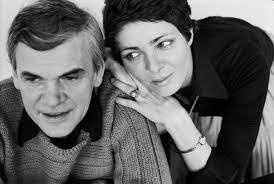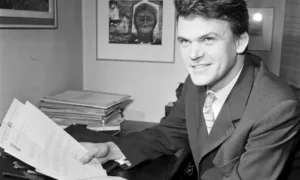Milan Kundera, originally from Czechoslovakia, became a French novelist. In 1975, he chose to live in exile in France and eventually obtained French citizenship in 1981. However, his Czechoslovak citizenship was taken away from him in 1979. It was not until 2019 that Kundera was granted Czech citizenship once again. One of Kundera’s most famous and well-regarded works is “The Unbearable Lightness of Being.”
Bio/Wiki
Age- 94 years
Height- 6′ 1″ (1.85 m)
Born- 1 April 1929,
Birthplace- Brno, Czechia
Death- 11 July 2023
Deathplace- Paris, France
Profession-Auther, Poet, Novelist
Spouse- Věra Hrabánková (m. 1967), Olga Haasová
Nationality- Czech, French
Influenced by-Franz Kafka, Friedrich Nietzsche, MORE
Family
Born into a middle-class family, Milan Kundera came into the world on Purkyně Street 6 in Královo Pole, a neighborhood of Brno, Czechoslovakia, in 1929. His father, Ludvík Kundera (1891–1971), held significant roles as a Czech musicologist and pianist, serving as the director of the Janáček Music Academy in Brno from 1948 to 1961. Kundera’s mother was named Milada Kunderová (born Janošíková).
Wife
Milan Kundera was married twice during his lifetime, and at the time of his passing, his partner was Věra Hrabánková, whom he married in 1967. His first wife was Olga Haasová-Smrčková, an operetta singer and actress who sadly passed away on December 11, 2022, in Brno at the age of 85.
Kundera and Věra Hrabánková got married in 1967 and initially lived in Czechoslovakia. However, due to political pressures, they made the decision to move to France in 1975.

As Kundera’s life partner, Hrabánková shared a deep connection with him, and his loss left her in a state of grief and sorrow.
Even while residing in France, Kundera continued to write and publish, with Hrabánková playing a crucial role as his editor and translator.
Věra, as Kundera’s wife, played a significant part in his life. She translated his works, managed his social interactions, and shielded him from the outside world.
She even facilitated his friendship with Roth by acting as their language intermediary. A profile from 1985 highlighted her role in answering phone calls and handling the various demands that come with being a renowned author.
Children
Unfortunately, specific details regarding Milan Kundera’s children, including their names, ages, and professions, are not available. It is known that he had two daughters during his long marriage to Věra Hrabánková, according to TvShowStars. However, further information about his children is not widely documented.
Education
Under the guidance of his father, Milan Kundera acquired piano skills and pursued studies in musicology and musical composition. The influence of music, including its references and notation, can be detected throughout his literary works. Interestingly, Kundera was also related to Ludvík Kundera, a Czech writer and translator. He belonged to a generation of young Czechs who had limited exposure to the pre-war democratic Czechoslovak Republic. Their beliefs and ideologies were profoundly shaped by their experiences during World War II and the period of German occupation.
Career
Political And Professional Career
Trefulk’s novella “Happiness Rained on Them” (1962) vividly depicted Milan Kundera’s expulsion from the Communist party, which also served as a central theme in his novel “The Joke” (1967). After being readmitted to the Party in 1956, Kundera faced a second expulsion in 1970. During the 1968 Prague Spring, a period of reformist activities, Kundera, alongside other communist writers like Pavel Kohout, played a peripheral role. However, the Soviet invasion of Czechoslovakia in August 1968 crushed these reformist efforts.
Despite the setback, Kundera remained dedicated to reforming Czechoslovak communism and engaged in public debates with fellow writer Václav Havel. He advocated for calmness, highlighting that no one was being imprisoned for their opinions at the time. Kundera even suggested that the significance of the Prague Autumn might ultimately surpass that of the Prague Spring. Eventually, Kundera abandoned his hopes for reform and relocated to France in 1975. He taught at the University of Rennes for a few years before pursuing his writing career.

Work
Although Milan Kundera’s early poetry reflected a strong pro-communist stance, his novels defy easy ideological classification. He consistently emphasized that he was primarily a novelist rather than a politically motivated writer. Following the publication of “The Unbearable Lightness of Being,” political commentary became less prominent in his novels, giving way to broader philosophical themes. Kundera’s fiction style, interwoven with philosophical digressions, drew inspiration from authors like Robert Musil and the philosophy of Nietzsche. Scholars such as Alain de Botton and Adam Thirlwell have also interpreted his works through a philosophical lens.
In 1947, Kundera’s first published text was a poem dedicated to his music teacher, Pavel Haas, who had been murdered in Nazi death camps.
Kundera expressed admiration for Renaissance authors like Giovanni Boccaccio, Rabelais, and especially Miguel de Cervantes, to whom he felt a deep commitment. He also drew inspiration from writers such as Laurence Sterne, Henry Fielding, Denis Diderot, Robert Musil, Witold Gombrowicz,
Hermann Broch, Franz Kafka, and Martin Heidegger. Initially writing in Czech, Kundera transitioned to writing his novels in French starting in 1993. Between 1985 and 1987, he personally revised the
French translations of his earlier works. His books have been translated into numerous languages, expanding his international readership.
Writing Style And Philosophy
Kundera’s approach to character development involved explicitly acknowledging them as products of his imagination. He utilized a first-person narrator who provided commentary on the characters within third-person narratives. He prioritized the words that shaped his characters over their physical appearances, believing that the reader’s imagination would fill in the visual details. In his works, Kundera focused on the essential aspects of his characters, often neglecting their psychological interior. While specific features or traits may occasionally become idiosyncratic focuses, character specifics tend to be vague.
According to François Ricard, Kundera conceived his fiction with an overarching view of his entire body of work, exploring themes and meta-themes that spanned his oeuvre. Exile, identity, life beyond boundaries, the cyclical nature of history, and the pleasure of a less “important” life are among these meta-themes.
Many of Kundera’s characters serve as embodiments of these themes, sometimes at the expense of their full humanity. It is not uncommon for Kundera to introduce multiple main characters or completely discontinue a character, reshaping the plot with new individuals. Kundera considered intimate life as a personal secret, something valuable and integral to one’s uniqueness.
While Kundera’s early novels explore the tragic and comic aspects of totalitarianism, he did not intend them as political commentaries. Instead, he found interest in the parallel between totalitarianism and the timeless dream of a harmonious society where public and private life merge. In his exploration of this topic, Kundera shows a profound influence from Franz Kafka.
Kundera viewed himself as a writer without a specific message. He embraced irony and moral ambiguity in his works, deliberately avoiding overt messages or clear-cut positions. He valued the essence of the novel as an art form and delighted in the misunderstanding of his works.
Music also played a significant role in Kundera’s writings. He delved into the analysis of Czech folk music, referenced composers like Leoš Janáček and Bartók, included musical excerpts within the text, and explored subjects like Schoenberg and atonality.
Achievement/ Awards
- In 1985, Milan Kundera was honored with the Jerusalem Prize, and his acceptance address was later included in the collection of essays titled “The Art of the Novel.”
- He received The Austrian State Prize for European Literature in 1987.
- In 2000, Kundera was recognized with the international Herder Prize.
- The Czech State Literature Prize was bestowed upon him in 2007.
- Kundera received the Prix mondial Cino Del Duca in 2009.
- In 2010, he was granted honorary citizenship of his hometown, Brno.
- The Ovid Prize was awarded to him in 2011.
- In recognition of his contributions, an asteroid discovered in 1983 at the Kleť Observatory was named 7390 Kundera.
- In 2020, he received the prestigious Franz Kafka Prize, a literary award in the Czech Republic.
Bibliography
Novel
- “The Joke” (Žert) – Published in 1967.
- “Life Is Elsewhere” (Život je jinde) – Published in 1969.
- “The Farewell Waltz” (Valčík na rozloučenou) – Also known as “The Farewell Party.” Original translation title: “The Farewell Party.” French version: “La Valse aux Adieux.” Published in 1972.
- “The Book of Laughter and Forgetting” (Kniha smíchu a zapomnění) – Published in 1979.
- “The Unbearable Lightness of Being” (Nesnesitelná lehkost bytí) – Published in 1984.
- “Immortality” (Nesmrtelnost) – Published in 1988.
- “Slowness” (La Lenteur) – Published in 1995.
- “Identity” (L’Identité) – Published in 1998.
- “Ignorance” (L’Ignorance) – Published in 2000.
- “The Festival of Insignificance” (La fête de l’insignifiance) – Published in 2014.
Poetry Collection
- Člověk zahrada širá (Man: A Wide Garden) (1953)
- Poslední máj (The Last May) (1955) – celebration of Julius Fučík
- Monology (Monologues) (1957)
Essay
- sporech dědických (About the Disputes of Inheritance) (1955)
- Umění románu: Cesta Vladislava Vančury za velkou epikou (The Art of the Novel: Vladislav Vančura’s Path to the Great Epic) (1960)
- Český úděl (The Czech Deal) (1968)
- Radikalizmus a expozice (Radicalism and Exhibitionism) (1969)
- The Stolen West or The Tragedy of Central Europe (Únos západu aneb Tragédie střední Evropy) (1983)
- The Art of the Novel (L’art du Roman) (1986)
- Testaments Betrayed: An Essay in Nine Parts (Les testaments trahis: essai) (1993)
- D’en bas tu humeras les roses – rare book in French, illustrated by Ernest Breleur (1993)
- The Curtain (Le Rideau) (2005)
- An Encounter (Une rencontre) (2009)
Drama
- Majitelé klíčů (The Owners of the Keys) (1962)
- Dvě uši, dvě svatby (Two Ears, Two Weddings) (1968)
- Ptákovina (The Blunder) (1969)
- Jacques and His Master (Jakub a jeho pán: Pocta Denisu Diderotovi) (1981)
Net Worth 2023
Net Worth of Milan Kundera was, $200,000.
Cause Of Death
Milan Kundera, the renowned Czech writer known for his exploration of existence and betrayal through poetry, plays, essays, and novels such as “The Unbearable Lightness of Being,” has passed away at the age of 94 following a long illness, confirmed Anna Mrazova, spokesperson for the Milan Kundera Library.

Notably, Kundera left his native country for France in 1975 after being expelled from the Czechoslovakian Communist party due to his “anti-communist activities.” After his Czech citizenship was revoked in 1979, he spent four decades in exile in Paris. It was there that he penned his most famous works, including “The Unbearable Lightness of Being” (Nesnesitelná lehkost bytí). Eventually, he even switched to writing novels in French, starting with “La Lenteur” (Slowness) in 1995, and his final novel, “The Festival of Insignificance,” in 2014. Throughout his career, Kundera was often regarded as a potential Nobel laureate in literature.
Salman Rushdie, while speaking to the Guardian, remarked, “Milan Kundera, like all great writers, leaves an indelible impression on the imagination of his readers. ‘The struggle of man against power is the struggle of memory against forgetting.’ Since I read this sentence in his book ‘The Book of Laughter and Forgetting,’ it has stayed with me, shedding light on my understanding of events worldwide. Furthermore, Kundera’s notion that the novel descends from Samuel Richardson’s ‘Clarissa’ and Laurence Sterne’s ‘Tristram Shandy’ has given me a valuable perspective on my own literary lineage, firmly rooted in the Shandean branch of the family tree. Lastly, his concept of the ‘lightness of being’ cautioned us that life does not afford us revisions or second drafts, which can be both ‘unbearable’ and liberating.”
After four decades of absence, except for brief and unpublicized visits to their homeland, Kundera and his wife, Vera, had their Czech citizenship reinstated in 2019. The restoration followed a meeting with Czech Prime Minister Andrej Babiš, who deemed it a “great honor.” A year later, the Czech Republic’s ambassador to France, Petr Drulák, presented Kundera with his citizenship certificate, describing it as “a highly significant symbolic gesture, symbolizing the return of the greatest Czech writer to the Czech Republic.” Kundera reportedly received the document with gratitude and simply said, “thank you.”